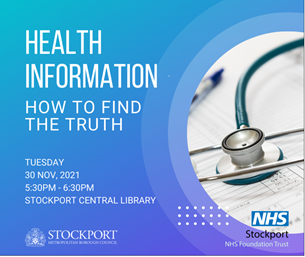Part I:
As a newcomer to health libraries, I wanted to immerse myself into the knowledge management landscape. Health literacy as a concept was something I was drawn to because of my interest in information and digital literacy. Kieran Lamb my library manager put me in touch with Siobhan Lyndsey due to her expertise in this area. We organised a team’s meeting and had a great discussion on the tenets and pedagogy of health literacy. Siobhan was kind enough to share some slides she created for a health literacy training session which formed the blueprint for my session.
With my background in public libraries, I have a keen interest in outreach, community engagement, and promoting the importance of health and information literacy to the public. Library outreach, in all its forms, requires that librarians leave their own traditional space, enter someone else’s space, learn about the people occupying that space, and create a connection between the two. My initial idea was to forge informal networks to see if there was interest in the community for the health literacy advocacy. I took inspiration from the Bolton Health Information Partnership, as my vision is to build a similar consortium of library and information services in Stockport. With that in mind, I decided to get in contact with Stockport Public Library to see if there was an appetite for collaboration. I managed to get in touch with Sara Brylyn who is the Health and Wellbeing development librarian.
We held a brainstorming session on Teams and quickly came to the realisation that it would be quite difficult to promote and implement a health literacy session for the public. I believe that my inexperience and gung-ho attitude probably wasn’t the best approach. It was decided instead to promote reliable, relatable, and authoritative online Health Information to members of the public who may not be aware of local, national, and international resources. I felt that my approach pushed the boundaries of health literacy outlook in theory, practice, and method. This approach is not typical in that health literacy advocacy is primarily based around a cascading model more commonly known as train the trainer sessions.

To make the event more marketable, Sara and I decided to come up with a more eye-catching title in ‘Health Information: How to find the Truth’. The idea behind this was that I would create slides defining misinformation from a historical and contemporary perspective. I would then go on to talk about how to spot misinformation online and how to differentiate between good and bad sources of information.
Sara was responsible for the marketing of the event as we felt Stockport Council would have a larger network than SHH. Sara created and distributed flyers in all the public libraries in Stockport as well as posting on Twitter and Facebook. An Eventbrite registration link was created so we could track the number of registrations meaning we had a fair idea of how many people would turn up.
On the eve of the event, I had this notion that maybe some anti-vaxxers might turn up. However, I dismissed this line of thinking as pure paranoia and also, I didn’t think many people would turn to our first event. As Sara and I set up the room, people started to fill in take their sits and relax. I had noticed that 6 out of the 8 members of the public weren’t wearing masks which did make me think my paranoia was justified. I managed to put that to the back of my mind, and I started my talk.
Read Part II of this article
James Ryan
Assistant Librarian
Stockport NHS Foundation Trust

